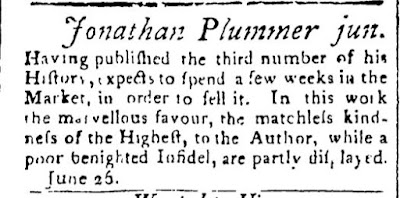Admittedly, we have always been drawn to period accounts of mob violence in Pre-Revolutionary War Boston. Little did we know that forty miles to the north the seaport town of Newburyport was carrying out its own brand of mob justice that rivaled that of Boston or Portsmouth, New Hampshire.
In September of 1768, word reached Newburyport that British troops had been dispatched by His Majesty’s government to Boston. Naturally, the news caused great concern and stress. Worse, rumors began to surface in the town that spies and informants working on behalf of royal custom officials were visiting seaport communities to identify smuggling operations.
Understandably, coastal towns that were invested in illicit trafficking did not take kindly to those who reported the activities to royal custom officials. For example, in Salem, an informant was discovered and quickly seized by an angry mob. Afterwards, "his Head, Body and Limbs were covered with warm Tar and then a large quantity of Feathers were applied to all Parts, which by closely adhering to the Tar, Exhibited an odd figure, the Drollery of which can easily be imagined." He was set in a cart with the placard "Informer on his breast and back and escorted out of town" by the mob, who warned him of worse treatment if he returned.

In early September, 1768, a Newburyport captain and smuggler named John Emery arrived in Portsmouth, New Hampshire. While on shore he was arrested by custom officers for violation of the royal revenue laws. Word traveled back to Newburyport and Joshua Vickery, a ship’s carpenter, and Francis Magno, a Frenchman, were quickly identified as the informants who disclosed Emery's smuggling ring.
The alleged basis for the accusation was simply that the two men were present in Portsmouth at the time of Captain Emery's arrest.
On September 10, 1768 a large mob armed themselves with clubs and began to search for the two men. According to the September 27th edition of the Essex Gazette, Vickery was quickly found and "in a riotous manner asaulted in the Kings Highway in Newbury-Port, seized and carried by Force to the public stocks in the said Town, where he sat from three to five o'clock, in the afternoon, most of the Time on the sharpest stone that could be found, which put him to extreme Pain, so that he once fainted."
When he regained consciousness, Vickery was "taken out of the Stocks, put into a cart and carried thro' the Town with a Rope about his Neck, his Hands tied behind him until the Dusk of the Evening, during which time he was severely pelted with Eggs, Gravel and Stones, and was much wounded thereby; he was then taken out of the Cart, carried into a dark Ware-houfe, and hand-cuffed with Irons, without Bed or Cloathing, and in a Room where he could not lay strait, but made the Edge of a Tar Pot serve for a Pillow, so that when he arofe the Hair was tore from his Head."
Vickery spent the next day (Sunday) under guard in the warehouse. Several of his friends attempted to visit the carpenter, only to be rebuffed by the mob. Only his wife, "who with Difficulty obtained Liberty to speak to him" was granted access.
On Monday, September 12th, Vickery was dragged out of the warehouse and subjected to intense questioning. Surprisingly, he was able to convince mob leaders "that he never did, directly or indirectly, make or give Information to any Officer of the Customs, nor to any other Person, either against Cap' John Emmery or any other man whomsoever."
Magno did not fare as well. He remained in hiding until Monday morning when he was captured. While in custody he confessed to being an informant for royal custom officials in Newburyport and Portsmouth. He was carried to a horse cart and tossed into it. Although exonerated of his accusations, Vickery was still compelled to lead the cart through the town. Afterwards, Magno "was stripped naked, tarred and then Committed to Gaol for Breach of the Peace."
What became of Magno after his release is unknown but it’s almost certain he fled Newburyport. Vickery and his wife remained in Newburyport until 1783 when they moved to Hampton Falls, New Hampshire. According to early 19th century accounts from the town, "he was a good penman, and reputed to have been a good citizen."







